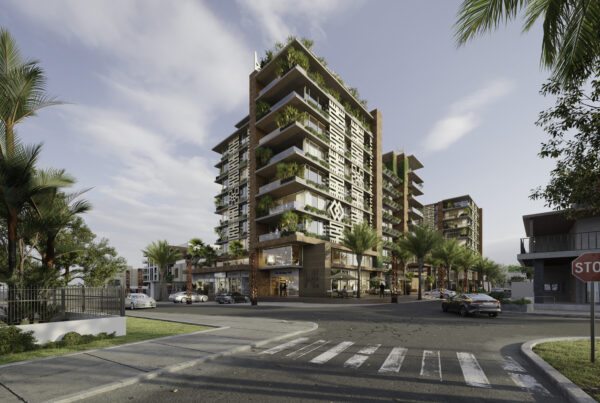As Ghana’s real estate market continues to evolve and present new opportunities, savvy investors are looking for strategies to maximise their returns in 2025. With a growing economy, increasing urbanisation, and a burgeoning middle class, Ghana’s property sector offers diverse investment options for both local and foreign investors. In this blog post, we’ll explore five lucrative real estate investment strategies that are poised to yield significant returns in the coming year.
Ghana’s Real Estate Market: A 2024 Outlook
Before diving into specific strategies, let’s take a quick look at the current state of Ghana’s real estate market and its projections for 2024. According to recent data, the Ghanaian real estate sector has shown resilience and growth, with a projected annual growth rate of 5.8% from 2021 to 2026. The market is driven by factors such as population growth, urbanisation, and increasing foreign direct investment.
As of 2024, the market continues to present attractive opportunities across various segments, from residential to commercial properties. With the government’s focus on infrastructure development and economic growth, the real estate sector is expected to play a crucial role in Ghana’s overall economic landscape.
Strategy 1: Luxury Residential Property Investment
As an investor looking to capitalise on Ghana’s burgeoning real estate market, luxury residential properties offer a compelling opportunity. The demand for high-end homes in prime areas of Accra such as Cantonments, Airport Residential, and East Legon has been steadily increasing. This growth is driven by high-net-worth individuals, expatriates, and returning diaspora Ghanaians seeking premium living spaces.
Your Potential Returns: Investing in luxury properties in these prime locations, you could realise rental yields of 7-18% annually. Moreover, these premium properties often experience significant capital appreciation over time, potentially doubling your investment value within 5-10 years.
Risks and Challenges to Consider:
- Substantial initial capital requirement
- Sensitivity of your investment to economic fluctuations
- Potential for market saturation in certain areas
How Ana Arkutu Consult Can Help You Implement This Strategy:
- Identify prime locations with strong demand: Ana Arkutu Consult’s deep market knowledge can guide you to the most promising areas for luxury investments.
- Advise on high-end amenities and modern designs: Leverage Ana’s expertise to ensure your property stands out in the competitive luxury market.
- Conduct thorough market analysis: Benefit from Ana’s up-to-date insights on market trends, helping you make informed investment decisions.
- Navigate legal and regulatory requirements: Ana Arkutu Consult can guide you through the complexities of property laws and regulations in Ghana, ensuring your investment is secure.
Strategy 2: Affordable Housing Projects
As a property investor, Ghana’s affordable housing sector presents a compelling opportunity. With a housing deficit exceeding 2 million units, this segment offers strong potential for steady, long-term returns. The government’s commitment to addressing this shortage through public-private partnerships further enhances the attractiveness of this investment avenue.
Your Potential Returns: While individual unit yields may be lower compared to luxury properties, the high volume and consistent demand in affordable housing can generate stable, long-term returns of 5-10% annually. This strategy allows you to diversify your portfolio while contributing to Ghana’s socio-economic development.
Risks and Challenges to Consider:
- Potential for regulatory changes affecting affordable housing investments
- Market risks associated with economic fluctuations impacting target tenants
- Balancing affordability with quality to ensure long-term property value
How Ana Arkutu Consult Supports Your Investment:
- Market Analysis: We provide in-depth insights into Ghana’s affordable housing market, helping you identify the most promising areas and project types for investment.
- Investment Opportunities: Our team scouts for existing affordable housing projects or developers seeking investors, saving you the complexities of direct development.
- Due Diligence: We conduct thorough assessments of potential investments, examining factors such as location, build quality, and developer track record to ensure you’re investing in viable projects.
- Regulatory Navigation: Our experts guide you through the regulatory landscape, helping you understand and leverage government incentives for affordable housing investments.
- Financial Analysis: We offer comprehensive financial projections and risk assessments, enabling you to make informed decisions about potential returns and risks.
- Portfolio Diversification: We can help you strategically incorporate affordable housing into your broader real estate portfolio, balancing risk and return across different property types.
Learn more about affordable housing initiatives in Ghana here.
Strategy 3: Commercial Real Estate Opportunities
As Ghana’s business sector grows, so does the demand for quality office spaces, retail centres, and industrial properties. Cities like Accra and Kumasi are seeing increased interest in modern commercial developments.
Potential Returns: Commercial properties can yield returns of 8-15% annually, with long-term leases providing stable income.
Risks and Challenges:
- Higher upfront costs and longer development timelines
- Potential oversupply in some submarkets
- Changing work patterns post-pandemic affecting office demand
Implementation Tips:
- Focus on flexible, multi-use developments
- Incorporate green building practices for long-term sustainability
- Target emerging business districts for potential high growth
Strategy 4: Land Banking
Land banking involves acquiring undeveloped land in strategic locations with the expectation of future appreciation. This strategy can be particularly effective in rapidly developing areas around major cities.
Potential Returns: While returns can vary widely, strategic land acquisitions have the potential for 100% or more appreciation over 5-10 years.
Risks and Challenges:
- Long holding periods with no immediate income
- Potential changes in zoning or development plans
- Land title issues and encroachment risks
Implementation Tips:
- Conduct thorough due diligence on land titles and zoning
- Focus on areas with planned infrastructure developments
- Consider partnering with local experts for market insights
Strategy 5: Real Estate Investment Trusts (REITs)
While still a developing concept in Ghana, REITs offer a way to invest in real estate without direct property ownership. As the Ghanaian financial market matures, REITs are expected to become more prevalent.
Potential Returns: REITs can offer returns of 6-12% annually, combining rental income and potential capital appreciation.
Risks and Challenges:
- Limited options currently available in the Ghanaian market
- Regulatory environment still evolving
- Market volatility affecting REIT share prices
Implementation Tips:
- Stay informed about new REIT offerings in the market
- Diversify across different types of properties and locations
- Consider both local and pan-African REIT options
Future Outlook for Ghana’s Real Estate Sector
Looking ahead, Ghana’s real estate sector is poised for continued growth and evolution. Key trends to watch include:
- Increasing demand for sustainable and green buildings
- Growing interest in mixed-use developments
- Expansion of real estate technology (PropTech) in the Ghanaian market
- Potential for more foreign investment as Ghana’s economy continues to strengthen
As the market matures, investors who position themselves strategically in 2024 will be well-placed to capitalise on these emerging trends and opportunities.
FAQs
- Q: Can foreigners own property in Ghana? A: Yes, foreigners can own property in Ghana, but there are some restrictions. Foreigners can obtain leasehold interests for up to 50 years, which are generally renewable.
- Q: What are the typical rental yields for residential properties in Accra? A: Rental yields for residential properties in Accra typically range from 7% to 18%, depending on the location, property type, and amenities.
- Q: Are there any tax incentives for real estate investors in Ghana? A: Yes, Ghana offers some tax incentives for real estate investors, including tax holidays for affordable housing projects and reduced corporate tax rates for some real estate investments.
- Q: What are the most promising areas for real estate investment in Ghana outside of Accra? A: Promising areas include Kumasi, Takoradi, and emerging coastal areas like Ada and Prampram, which are seeing increased development and tourism interest.
- Q: How has the COVID-19 pandemic affected Ghana’s real estate market? A: While the pandemic initially slowed market activity, the sector has shown resilience. There’s increased interest in properties with home office spaces and in less densely populated areas.
Conclusion
Ghana’s real estate market offers a wealth of opportunities for investors in 2025. From luxury developments to affordable housing, commercial properties to land banking, and the emerging REIT market, there are strategies to suit various investment goals and risk profiles. However, success in this market requires in-depth knowledge, careful planning, and expert guidance.
To navigate the complexities of Ghana’s real estate market and identify the best investment opportunities tailored to your goals, consider partnering with experienced professionals. Ana Arkutu Consult specialises in guiding both local and international investors through the intricacies of Ghana’s property market.
Ready to explore your real estate investment options in Ghana? Schedule a consultation with Ana Arkutu Consult today and take the first step towards building your profitable real estate portfolio in one of Africa’s most promising markets.






